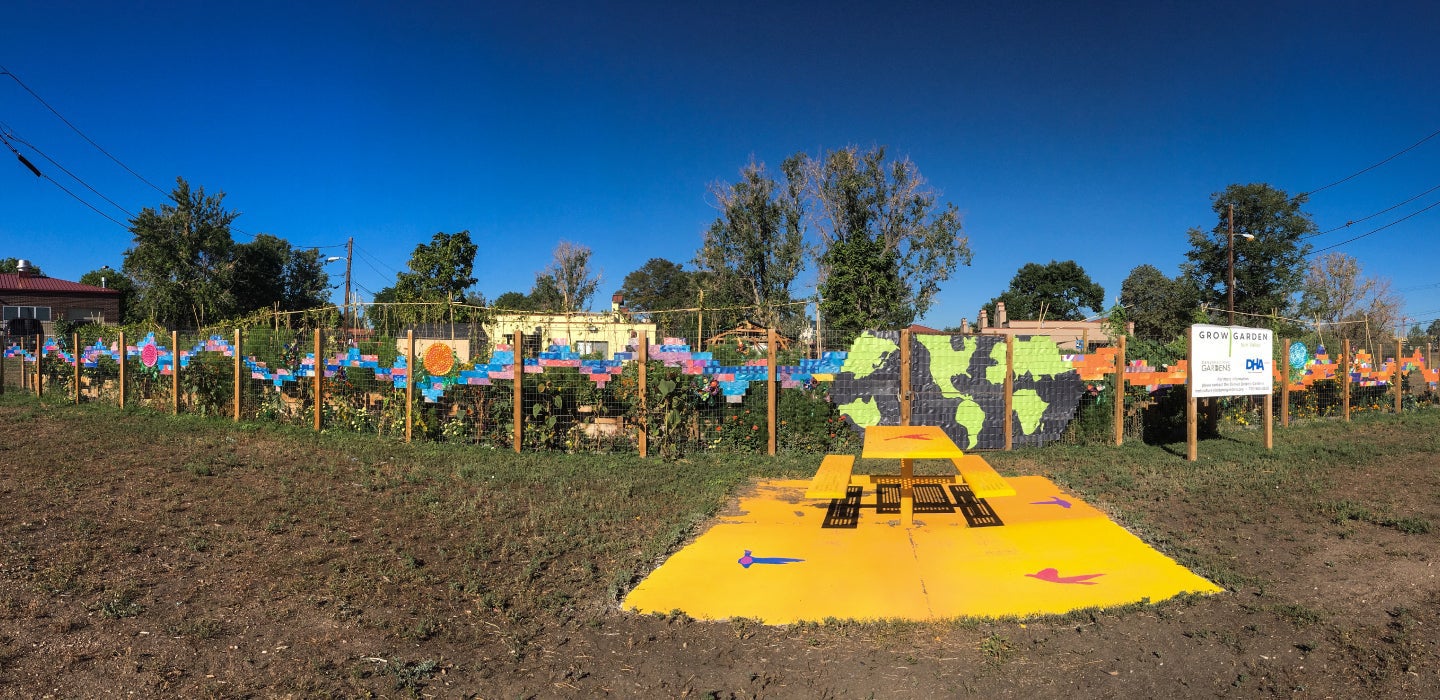2024-2025 Timeline
- Call for proposals: September 9 – October 7, 2024
- Pre-application meeting: September 26, noon - recording
- Award Notification: Early November 2024
- Funding: Mid-December 2024

Students in the Arts Street program at Youth Employment Academy worked with artists to create upcycled art in the Sun Valley neighborhood | P.S. You Are Here - Photo courtesy of Arts Street@YEA.
![]()
In 2024, DAV will invest $70,000 into the PSYAH program to support these neighborhood-based projects.
A PSYAH project must be led by an individual, entity or organization that is connected to the neighborhood where the project will be implemented. PSYAH projects should be physical in nature and be on display in a public space. These can include but are not limited to design interventions, community projects, artistic interpretations, and public art, streetscaping, landscaping, and functioning public amenities such as decorative benches, tables, and bicycle racks.
Applicants should clearly respond to the following question: Why is your proposed project relevant to the community and public space for which it was conceived, and what do you hope to achieve?
Program Goals
Program Goals
Additional Considerations
ELIGIBLE APPLICANTS
To be eligible, primary applicants must be connected to a City and County of Denver neighborhood and identify as:
Non place-based or Denver-based organizations, businesses, ad-hoc groups and individuals may participate through a partnership with the above eligible applicants but may not apply directly.
ELIGIBLE EXPENSES
P.S. You Are Here funding may be used to cover expenses directly related to the project, such as:
Planning & Personnel
Professional Services
Material, Supplies & Maintenance
INELIGIBLE PROJECTS & EXPENSES
Project funds may not be used for:
Selection Review
The following factors and criteria will be used to evaluate proposals
Staff and Review Committee
The grant program is administered by Denver Arts & Venues. Submissions will be reviewed by designated representatives of the City and County of Denver including Denver Arts & Venues, Department of Transportation and Infrastructure, Denver Parks & Recreation, the Risk Assessment Office, and representatives from the Denver Commission on Cultural Affairs. This group will work with and offer guidance to all grantee partners on how to navigate City processes throughout the implementation of the selected projects.
Project Implementation
The Denver Arts & Venues team will work with grant partners through the multiple phases of the project, including providing guidance on City processes related to permitting, construction, etc. The team will also provide marketing and promotional support to elevate the grant partners’ efforts and will collect project related photographs, video, text, and related press, to document the project.
Application Checklist
Proposals for the P.S. You Are Here grant should include:
For more information contact:
Michael Chavez, Curator of Public Art Partnerships, Denver Public Art Program
CONTACT MICHAEL
Lisa Gedgaudas, Program Manager, Cultural Affairs
CONTACT LISA
Contracting and Payments
All projects require a funding agreement between the grantee and the City & County of Denver
Potential Insurance and Liability Coverage Requirements
The following insurance MAY be required, depending on the scope of work. Our team will help you navigate this process:
Workers’ Compensation - State mandated coverage for employees injured on the job. Colorado Workers’ Compensation law requires any business with one or more employees to carry this type of insurance. Sole Proprietors (those with no employees) are not required to carry Workers’ Compensation. It is important to notify the City if this rule applies to you.
Business Auto Liability - Coverage for liability (negligence) claims by a third party related to the operation of an automobile. Auto insurance is required of all contractors who will be operating a vehicle as part of their contractual duties for the City. The standard limit required is $1,000,000. Contractors who use their personal vehicles can substitute their personal auto insurance for the business auto requirement. It is important to notify the City if this rule applies to you.
General Liability - Coverage for liability (negligence) claims by a third party related to bodily injury (injury to another person) or property damage (damage to another person’s property). Limits will vary depending on the scope of work. Minimum limit is generally $1,000,000.
Professional Liability - Coverage for claims related to a "professional’s" error in judgment, planning or design. Examples of work requiring professional liability are architectural designs and engineering studies. NOTE: if a third party is hired to do such work, that third party is allowed to carry the insurance.
To determine what type of insurance is required, final grantees will need to provide a Project Risk Assessment Form on:
IMPORTANT: Your contract with the City includes indemnification. You are responsible for any claims that arise out of your work with the City. Even if insurance is waived, it is in your best interest to determine any exposures/risks and potentially purchase insurance to cover that exposure/risk.
Applicants should consider how their programs and services are accessible to individuals with disabilities. This includes access accommodations for both the project and programs. These design standards shall be based on the Americans with Disability Act (ADA) and can be found at ada.gov. Assistance can also be found by contacting the Denver Office of Disability Rights: 720-913-8485.